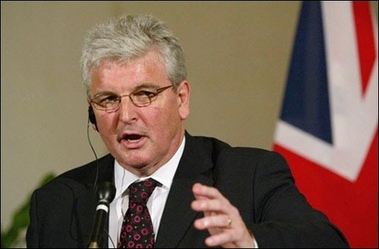LONDON - Britain has warned that the credibility of NATO is at stake in
Afghanistan after it was surprised by the strength of resisitance from the
Taliban, the country's hardline former rulers.
In a speech in London on Tuesday, Defence Secretary Des Browne underlined the
need for London's allies to share the burden of fighting in the volatile south
of the war-scarred country.
|

Defence Secretary Des Browne, seen here in
August 2006. In a speech in London, Browne underlined the need for
London's allies to share the burden of fighting in the volatile south of
the war-scarred country. [AFP]
|
Britain remains confident of ultimate victory, he said. But he admitted: "We
do have to accept that it's been even harder than we expected.
"The Taliban's tenacity in the face of massive losses has been a surprise,
absorbing more of our effort than we predicted it would and consquently slowing
progress in reconstruction," he told the Royal United Services Institute.
Instead, Browne called for a recommitment of all 26 NATO members to the task
of bringing peace and stability to the war-ravaged country, despite recent heavy
losses.
Browne said that there were "understandable concerns" among member countries
at bolstering the reconstruction and stability force in Afghanistan because of
the risks posed to troops in the country.
"But those of us who are already fully committed in the south -- ourselves,
the Canadians, the Dutch and the Estonians and the ever-present Americans --
must remind our partners that it was their agreement of support that brought us
to this point," he told the audience.
"The mission is vital, as it has always been. In fact, it is vital not only
for Afghanistan but also for the threat that a lawless Afghanistan poses to the
region and to the world and also, now that NATO has taken it on, for NATO's own
credibility," he said.
Browne said the mission had reached the point where they were tackling the
most difficult region -- the lawless south of Afghanistan.
"NATO nations must decide whether to back their investment, reaffirm their
original intent and to send a clear signal to the Taliban and to the Afghan
population that NATO has an alliance as strong and determined to see the task
through," he added.
Browne said the "fundamental point" was that NATO is an alliance and that
when it decides to use military force "all partners should be prepared to face
equal risk".
He added: "We must persuade our partners and help them to persuade their
publics" about the task in hand and help push the message to the Afghan people
that NATO was there to effect "real change" across the whole of society.
The transformation will be "massively worth" achieving for the Afghan people,
the wider region and for the international community, he added, although he
accepted that it looked "some way off".
"In part this was inevitable at this stage. NATO has been in charge in the
south for less than two months and we always knew that the south would be
hard...," he said.
In a question and answer session after the speech, Browne called on
neighbouring Pakistan to step up its efforts to stem the flow of fighters and
aid crossing the notoriously porous border.
"Pakistan is part of the problem but it is also part of the solution," he
added.